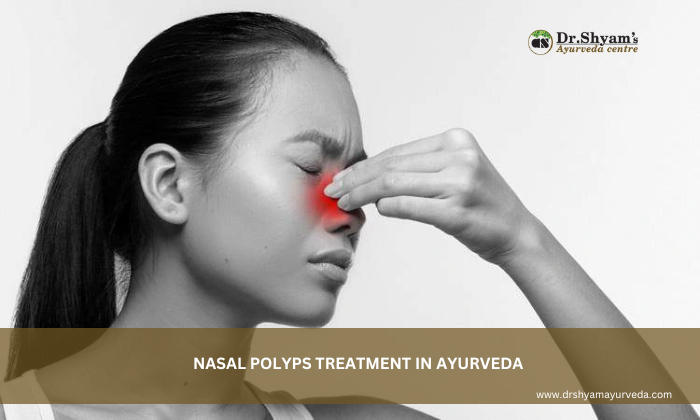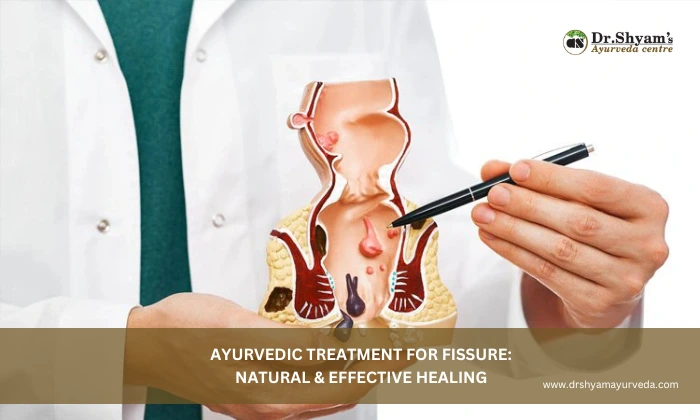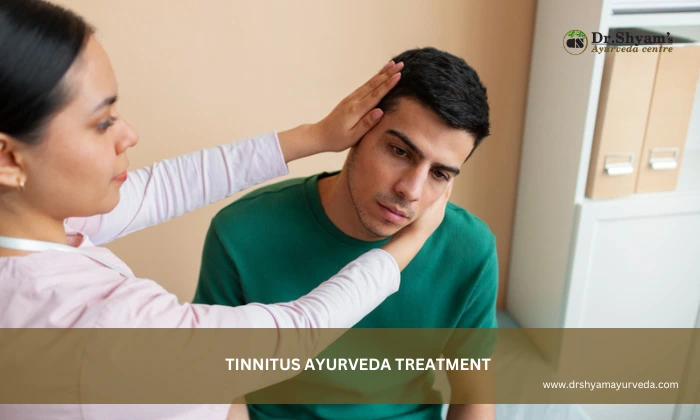Key Takeaways
- Nasal polyps are non-cancerous, soft growths in the nasal or sinus lining caused by chronic inflammation; they lead to symptoms, including nasal blockage, loss of smell, sinus pressure, and breathing difficulty.
- In Ayurveda, nasal polyps are correlated with Nasaarsha, arising from vitiation of doshas due to suppressed natural urges, irritant exposure, or poor nasal hygiene, and are classified as Vataja, Pittaja, Kaphaja, and Sannipataja types.
- Ayurvedic management of nasal polyps focuses on balancing doshas, reducing inflammation, and strengthening nasal mucosa through Oushadhi, Kshara Karma, Agnikarma, Nasyam, and Dhoopanam, along with formulations, including Triphala Guggulu, Varanadi Kashayam, and Guggulutiktakam Kashayam.
- Home remedies such as turmeric milk and steam inhalation; yoga and pranayama such as Bhramari and Nadi Shodhana; and preventive measures including an anti-inflammatory diet, good nasal hygiene, and stress management help prevent recurrence.
What Are Nasal Polyps?
Nasal polyps are soft, non-cancerous growths that form on the lining of the nose or sinuses. They develop in the mucosa that lines the nasal and sinus passages. Nasal polyps usually appear on both sides of the nose. They can become irritated and swollen, making it difficult to breathe through the nose.
Small nasal polyps are teardrop-shaped and may not cause any symptoms. As they grow larger, they can resemble peeled grapes that are yellow, pink, or gray in color and may block the nasal or sinus airways, leading to breathing problems.
Nasal polyps are more common in young and middle-aged individuals. It is more common in males than in females. The overall risk of developing nasal polyps increases with age.
Symptoms of Nasal Polyps
Small nasal polyps might not cause any symptoms. As they grow larger, they can lead to:
- Nasal congestion
- Runny nose
- Loss of taste or smell
- Headaches
- Nosebleeds
- Postnasal drip
- Snoring
- Pressure in the sinuses
- Facial pain or pain in the upper teeth
- Itching around the eyes
Large nasal polyps can cause:
- Frequent asthma attacks in individuals with asthma
- Repeated sinus infections
- Sleep disturbances
- Difficulty breathing
Read more: Acne Rosacea—Ayurvedic Management
Ayurvedic View on Nasal Polyps (Nasaarsha)
In Ayurveda, nasal polyps can be correlated with Nasaarsha. Nasa means nose, and Arsha refers to a pile-like outgrowth. Protrusions similar to piles that appear inside the nasal cavity are considered Nasaarsha.
The suppression of natural urges, especially sneezing, or the introduction of foreign objects such as pens, pencils, or needles into the nose, exposure to irritants, and poor nasal hygiene can vitiate the doshas. The vitiated doshas contaminate the skin, muscle, and fat tissues around the nasal cavity, leading to fleshy outgrowths of various kinds and shapes.
Acharya Sushruta has described four types of Nasaarsha: Vataja, Pittaja, Kaphaja, and Sannipataja.
Common Causes and Risk Factors
The exact cause of nasal polyps is not completely understood due to the complexity of the condition. However, they are closely linked to chronic inflammation of the nasal passages and sinuses, known as chronic rhinosinusitis, which lasts for 12 weeks or longer. This persistent inflammation irritates and swells the lining of the nasal and sinus mucosa, eventually leading to the formation of nasal polyps. While inflammation is a known trigger, it’s unclear why some individuals develop nasal polyps while others with similar inflammation do not.
Certain health conditions and genetic factors can increase the likelihood of developing nasal polyps. Common risk factors include:
- Asthma
- Allergic rhinitis.
- Chronic sinus infections
- Cystic fibrosis
- Hypersensitivity to NSAIDs (nonsteroidal anti-inflammatory drugs)
- Genetic predisposition
Read more: Ayurvedic medicine for tremors
Ayurvedic Treatment for Nasal Polyps
Ayurvedic treatment for nasal polyps aims to balance the doshas, reduce symptoms, and strengthen the nasal mucosa. The treatment principles for nasal polyps in Ayurveda include the following:
- Oushadhi: The intake of medicinal formulations with dosha-balancing properties, especially those that pacify Kapha dosha, helps reduce the growth of nasal polyps.
- Kshara Karma: The application of kshara (alkali) with teekshna, lekhana, tridoshaghna, and ushna properties externally helps arrest the growth of nasal polyps.
- Agnikarma: Cauterization of the nasal polyps using controlled heat therapy.
- Nasyam: Instilling medicated oils with teekshna, lekhana, and tridoshaghna properties helps manage nasal polyps by clearing the nasal passages and balancing the doshas.
- Dhoopanam: Fumigation with Haridra varti helps reduce inflammation and prevents recurrence.
Effective Ayurvedic Medicines for Nasal Polyps
Ayurvedic medicine for nasal polyps includes:
- Grihadhuma Taila
- Karaviradi Taila
- Chitrakadi Taila
- Triphala Guggulu
- Varadi Kashayam
- Varanadi Kashayam
- Chiruvilwadi Kashayam
- Guggulutiktakam Kashayam
- Dashamularishtam
- Abhayarishtam
Disclaimer: Always take Ayurvedic medicines for nasal polyps under the guidance of a registered Ayurvedic practitioner.
Read more: Chickenpox treatment in Ayurveda
Home Remedies & Natural Practices
Natural home remedies for nasal polyps can help relieve the symptoms of nasal polyps, reduce inflammation, and promote easier breathing. It includes:
- Turmeric milk
- Steam inhalation
- Using a humidifier at home
- Nasal irrigation using a neti pot or saline solution
- Saline spray
Yoga and Pranayama for Nasal Polyps
Incorporating yoga and pranayama into a daily routine can help improve nasal airflow, reduce inflammation, and support sinus health naturally. The common yoga for nasal polyps includes:
- Bhramari Pranayama: Creates soothing vibrations that open nasal passages and ease sinus pressure.
- Nadi Shodhana: Balances the nervous system, enhances airflow, and reduces nasal congestion.
- Asanas, including Bridge Pose and Child’s Pose: Promote sinus drainage, improve breathing, and relieve nasal blockage.
- Jala Neti: Helps clear mucus and allergens, maintaining nasal hygiene.
Read more: Ayurvedic Cure for Hyperhidrosis
Preventive Lifestyle and Diet Tips
A balanced lifestyle and healthy diet can help prevent nasal polyps and reduce their recurrence by keeping inflammation under control.
- Eat anti-inflammatory foods, including fruits, vegetables, whole grains, and omega-3-rich foods.
- Avoid trigger foods such as processed sugar, fried items, aged cheese, and preserved meats.
- Drink plenty of water
- Limit exposure to cigarette smoke, dust, and strong fumes to prevent irritation.
- Manage allergies, asthma, and sinus infections to reduce inflammation.
- Exercise regularly, get enough sleep, and manage stress to boost immunity.
- Maintain nasal hygiene by using saline sprays or rinses to clear mucus and allergens.
Conclusion
At Dr. Shyam’s Ayurveda, we believe that managing nasal polyps requires more than just symptom relief; it demands restoring internal energy and strengthening the body’s natural balance. Through Ayurvedic treatment in Dubai, patients can experience a holistic approach that not only addresses nasal blockages and inflammation but also targets the root cause by balancing the doshas and purifying the body.
For chronic or recurring cases, our specialized Panchakarma treatment in Dubai offers deep detoxification and rejuvenation therapies that cleanse the sinuses, enhance immunity, and promote long-term respiratory health. With the right combination of herbal formulations, personalized therapies, and lifestyle guidance, Ayurveda provides a safe and effective path toward lasting relief from nasal polyps and improved overall well-being.
FAQs
1. What is the best Ayurvedic medicine for nasal polyps?
Formulations such as Triphala Guggulu, Varanadi Kashayam, and Guggulutiktakam Kashayam, along with medicated oils such as Grihadhuma Taila, Karaviradi Taila, and Chitrakadi Taila, are considered highly effective for managing nasal polyps. These help reduce inflammation, shrink the growths, and restore healthy nasal mucosa.
2. Can Nasya therapy permanently cure nasal polyps?
Nasya therapy helps manage nasal polyps by clearing blockages, reducing inflammation, and balancing the doshas. While it offers significant relief and prevents recurrence, a long-term cure depends on consistency in treatment, dosha balance, and lifestyle correction.
3. How long does it take for Ayurvedic treatment to show results?
Ayurvedic treatment for nasal polyps typically shows improvement within 4 to 6 weeks, depending on the severity and chronicity of the condition. Long-term relief requires continued medication, detoxification, and adherence to dietary and lifestyle recommendations.
3. Are there any home remedies to reduce nasal polyps naturally?
Yes, home remedies such as drinking turmeric milk, performing steam inhalation, using a humidifier, and nasal irrigation with saline can help reduce inflammation and ease symptoms naturally. These remedies support the effects of Ayurvedic treatment and prevent recurrence.
4. Which yoga poses are most effective for nasal blockage and sinus relief?
Yoga practices, including Bhramari Pranayama, Nadi Shodhana, Bridge Pose (Setu Bandhasana), and Child’s Pose (Balasana), are highly effective for improving nasal airflow and relieving sinus congestion. Regular practice enhances breathing capacity and promotes sinus drainage.











